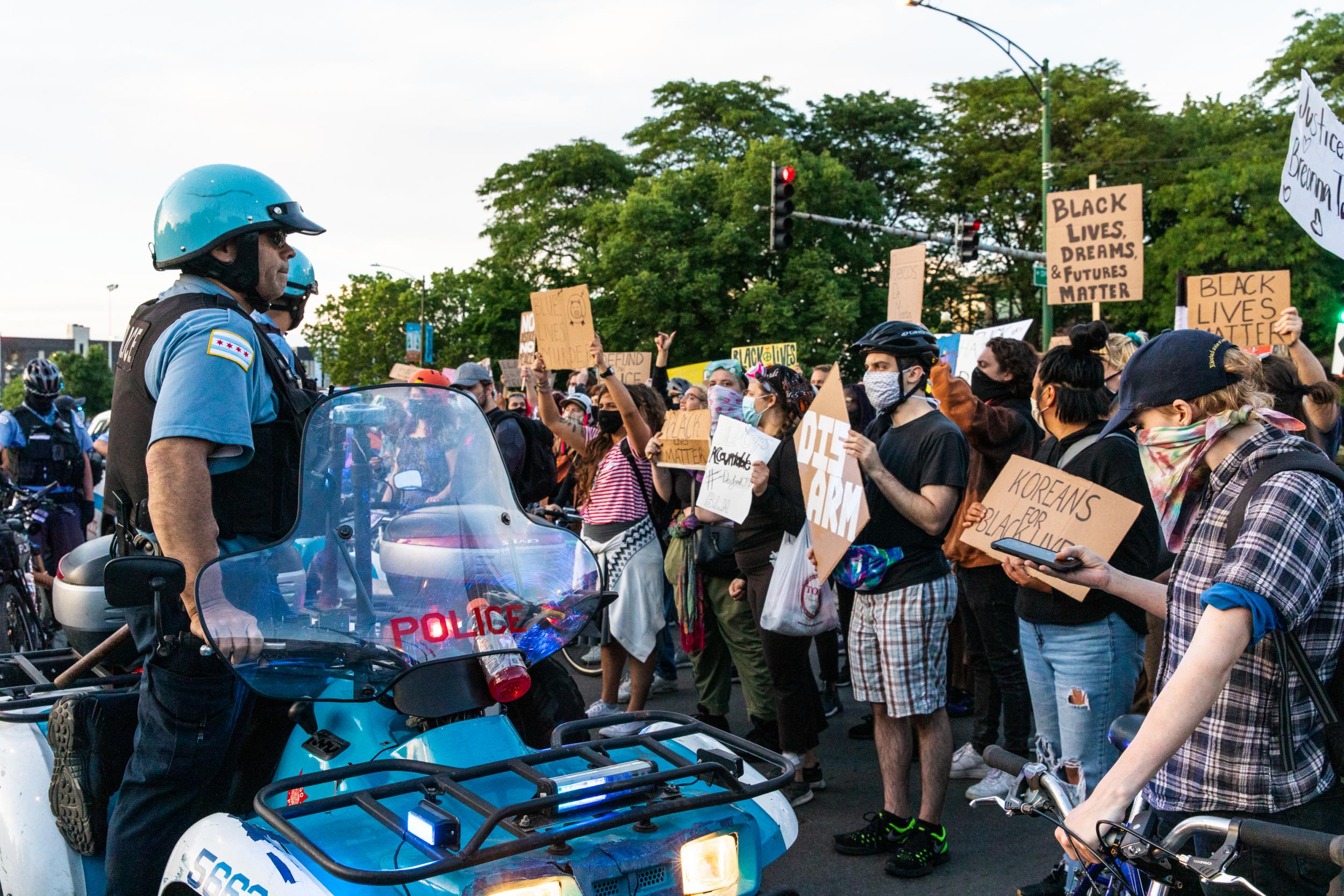The Independent's journalism is supported by our readers. When you purchase through links on our site, we may earn commission.
If you're surprised by police punching a teenager in the face in Chicago, here's a history lesson
This is why Chicagoans mean it when we say abolish the police


Your support helps us to tell the story
From reproductive rights to climate change to Big Tech, The Independent is on the ground when the story is developing. Whether it's investigating the financials of Elon Musk's pro-Trump PAC or producing our latest documentary, 'The A Word', which shines a light on the American women fighting for reproductive rights, we know how important it is to parse out the facts from the messaging.
At such a critical moment in US history, we need reporters on the ground. Your donation allows us to keep sending journalists to speak to both sides of the story.
The Independent is trusted by Americans across the entire political spectrum. And unlike many other quality news outlets, we choose not to lock Americans out of our reporting and analysis with paywalls. We believe quality journalism should be available to everyone, paid for by those who can afford it.
Your support makes all the difference.Last Friday, during anti-racist protests in Chicago, a police officer was caught on video punching an 18-year-old woman in the face. Miracle Boyd — a member of the activist group GoodKids, MadCity — says the officer knocked out several of her teeth. She also says the police took her phone, which she had been using to film them hitting another woman with batons.
Chicago Mayor Lori Lightfoot condemned protestors who were said to have thrown fireworks or rocks. She also said that police violence was "unacceptable" and that all complaints would be dealt with by the Civilian Office of Police Accountability. In isolation, that sounds like a balanced response. But in light of Chicago's history of police brutality and unaccountable police violence, it isn't reassuring. Police in Chicago have tortured, assaulted, and murdered Black people for generations, while city officials did nothing, or actively encouraged them. Violent, racist policing in Chicago is not an aberration. Too often, it's been the default.
Violent policing of Black people has been endemic since police have existed in the US. But police attacks on the Black Panther party in the 1960s are a good place to start with a history of modern racist policing in Chicago. The Panthers launched school breakfast programs and medical clinics; they also stocked firearms and insisted they would resist police brutality. The police and their advocates were incensed; The Chicago Tribune ran an editorial with the racist headline "No quarter for wild beasts."
The FBI infiltrated the Panthers and provided police with a diagram of the apartment of one of their most important young leaders, 21-year-old Fred Hampton. Police raided his apartment in the early morning hours of December 4, 1969, killing him and another Panther, Mark Clark. Police claimed they were fired upon and had killed Hampton in self-defense. But subsequent ballistics evidence found that the police had fired 99 shots and the Panthers only one. Hampton and Clark's survivors won a $1.85 million settlement from the city. None of the police involved in or responsible for the raid were prosecuted.
Even while the Hampton suit was working its way through the courts, police brutality continued. Police commander Jon Burge and officers under him arrested and then tortured more than 200 Black men between 1972 and 1991. Burge's victims reported being shocked with electricity and smothered with plastic bags to force false confessions. On the basis of this manufactured evidence, many of them were sent to prison for decades for crimes they didn't commit. Then-state attorney Richard M Daley, who later became mayor, was implicated in the refusal to investigate torture, and in using false confessions in prosecutions.
Journalists, activists, and torture victims spent decades trying to hold Burge accountable. He was finally convicted of perjury in 2011. In 2015, the Chicago City Council passed a reparations package for torture survivors which included cash payments for survivors, funds for a justice center, a school curriculum, a memorial, and other provisions.
But again, even as the city and the courts acknowledged racist police violence in Chicago, that violence claimed more victims. It was reported in 2015 that the city was operating a "black site", where police were believed to hide suspects from their attorneys, shackle, and beat them. And police continue to disproportionately deploy violence against Black people. For example, three of every four people shocked with Tasers in Chicago between 2012 and 2015 were Black, including 23-year-old Dominique Franklin, who died after being tased in 2014.
That same year, police officer Jason Van Dyke murdered 16-year-old Laquan McDonald by shooting him 16 times. Officers engaged in a five year cover-up, exaggerating the threat from McDonald and justifying their colleague, who was finally convicted of second-degree murder and multiple counts of assault in 2019. Mayor Lori Lightfoot supported the release of information about McDonald's murder. Yet when police brutality occurs on her watch, she acts as if the problem is individual excesses by officers, rather than a sweeping culture of police violence and racism.
Chicago activists have witnessed the persistent, horrific, lawless police violence in Chicago, and have understandably concluded that police reform is not effective. Mariame Kaba, a tireless organizer who lived in Chicago between 1995 and 2016, is widely considered the founder of the modern police abolition movement. In a recent op-ed for the New York Times she argued forcefully that "We can’t reform the police. The only way to diminish police violence is to reduce contact between the public and the police."
Kaba's article draws examples from the US as a whole. But Chicago's experience of police reform is as stark, and as disheartening, as any place in the country. Activists have won civil suits. They've won reparations. They've won convictions of police officers. They've helped to unseat tough-on-crime prosecutors who supported racist policing. And yet, this week, police knocked out the teeth of a peaceful Black anti-racist protestor. No amount of reform or legal rebuke seems sufficient to keep Chicago police from committing racist violence.
The call to abolish police isn't a fanciful dream. It's born of brutal, bloody, ugly, grinding experiences of violence, terror, and grief. The CPD can't be reformed. It can only be starved of money, reduced, and ultimately eliminated. Until that happens, police will continue to beat, torture, and murder Black people in Chicago, as they have done for decades.
Join our commenting forum
Join thought-provoking conversations, follow other Independent readers and see their replies
Comments